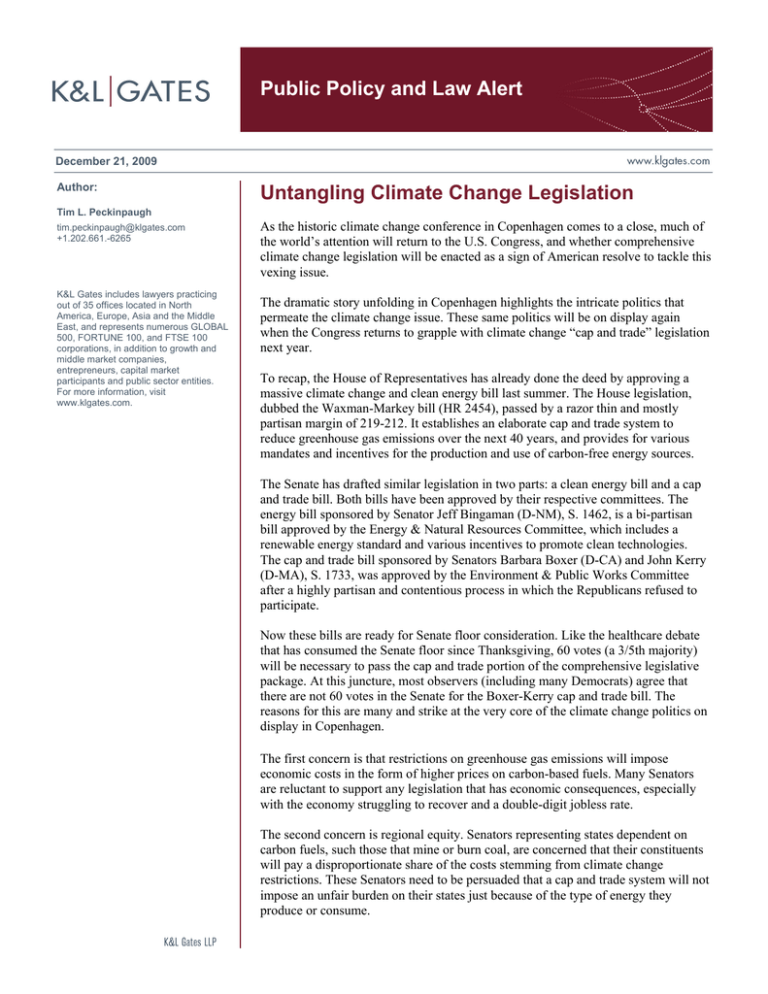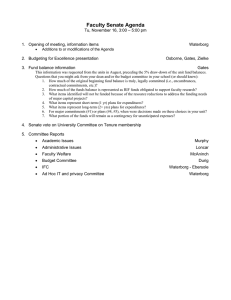
Public Policy and Law Alert
December 21, 2009
Author:
Untangling Climate Change Legislation
Tim L. Peckinpaugh
tim.peckinpaugh@klgates.com
+1.202.661.-6265
K&L Gates includes lawyers practicing
out of 35 offices located in North
America, Europe, Asia and the Middle
East, and represents numerous GLOBAL
500, FORTUNE 100, and FTSE 100
corporations, in addition to growth and
middle market companies,
entrepreneurs, capital market
participants and public sector entities.
For more information, visit
www.klgates.com.
As the historic climate change conference in Copenhagen comes to a close, much of
the world’s attention will return to the U.S. Congress, and whether comprehensive
climate change legislation will be enacted as a sign of American resolve to tackle this
vexing issue.
The dramatic story unfolding in Copenhagen highlights the intricate politics that
permeate the climate change issue. These same politics will be on display again
when the Congress returns to grapple with climate change “cap and trade” legislation
next year.
To recap, the House of Representatives has already done the deed by approving a
massive climate change and clean energy bill last summer. The House legislation,
dubbed the Waxman-Markey bill (HR 2454), passed by a razor thin and mostly
partisan margin of 219-212. It establishes an elaborate cap and trade system to
reduce greenhouse gas emissions over the next 40 years, and provides for various
mandates and incentives for the production and use of carbon-free energy sources.
The Senate has drafted similar legislation in two parts: a clean energy bill and a cap
and trade bill. Both bills have been approved by their respective committees. The
energy bill sponsored by Senator Jeff Bingaman (D-NM), S. 1462, is a bi-partisan
bill approved by the Energy & Natural Resources Committee, which includes a
renewable energy standard and various incentives to promote clean technologies.
The cap and trade bill sponsored by Senators Barbara Boxer (D-CA) and John Kerry
(D-MA), S. 1733, was approved by the Environment & Public Works Committee
after a highly partisan and contentious process in which the Republicans refused to
participate.
Now these bills are ready for Senate floor consideration. Like the healthcare debate
that has consumed the Senate floor since Thanksgiving, 60 votes (a 3/5th majority)
will be necessary to pass the cap and trade portion of the comprehensive legislative
package. At this juncture, most observers (including many Democrats) agree that
there are not 60 votes in the Senate for the Boxer-Kerry cap and trade bill. The
reasons for this are many and strike at the very core of the climate change politics on
display in Copenhagen.
The first concern is that restrictions on greenhouse gas emissions will impose
economic costs in the form of higher prices on carbon-based fuels. Many Senators
are reluctant to support any legislation that has economic consequences, especially
with the economy struggling to recover and a double-digit jobless rate.
The second concern is regional equity. Senators representing states dependent on
carbon fuels, such those that mine or burn coal, are concerned that their constituents
will pay a disproportionate share of the costs stemming from climate change
restrictions. These Senators need to be persuaded that a cap and trade system will not
impose an unfair burden on their states just because of the type of energy they
produce or consume.
Public Policy and Law Alert
A third concern relates to the mechanics of cap and
trade. With the memories of the sub-prime financial
meltdown still fresh, some Senators fear that
creating a new and complex market to trade carbon
credits is fraught with potential gaming and even
abuse. The House-passed cap and trade system has
also been roundly criticized for giving away up front
too many free credits to utilities and carbon
producers to curry political support.
The combination of these concerns, along with a
healthy dose of partisan politics punctuated by the
increasingly polarizing healthcare debate, has
rendered the Boxer-Kerry bill essentially DOA on
the Senate floor. So, if the Senate is to proceed in the
illusive effort to cobble together a coalition of 60
votes to pass climate change legislation, a new
approach is probably needed. At least two
alternative legislative proposals have been
presented.
The first alternative proposal is an energy production
bill being brokered by Senator Lindsey Graham (RSC) with help from Senators Kerry and Joe
Lieberman (I-CT). Graham’s proposal marries
greenhouse gas emission reduction targets with a
more aggressive campaign to develop domestic
energy resources, particularly nuclear power (the
largest source of carbon-free energy), clean coal, and
offshore oil and gas. Graham has put himself at odds
with most in his party by being prepared to accept a
modified cap and trade program, provided it also
features some consumer protections and expanded
energy production to reduce dependence on
unreliable foreign supplies.
The second alterative is a “cap and dividend”
proposal advanced by Senators Maria Cantwell (DWA) and Susan Collins (R-ME). This bi-partisan
approach gets credit for its simplicity (it’s only 39
pages of legislative text compared to over 1,000
pages for the cap and trade bills). It would set up a
pure auction in which producers and importers of
fossil fuels, not emitters like utilities, would have
their emissions capped and only they could
participate in an auction to allocate carbon permits.
Revenues generated by the auction would be split
two ways: 75% to the public to help defray higher
energy costs and 25% to support energy efficiency
and developing new clean energy technologies.
It will likely take one of these proposals, or perhaps
a combination and other fresh approaches, such as a
straightforward carbon tax, to break the impasse in
the Senate to allow consideration and passage of
climate change legislation. Even then, it will be a
slog in winning approval in the Senate of any
meaningful climate legislation, especially on the
heels of the marathon Senate healthcare debate and
as next year’s November elections approach.
Finally, if the 60 votes aren’t there for climate
change legislation, the Senate may proceed
separately with the Bingaman clean energy bill with
its incentives and mandates to promote renewables
and energy efficiency, most of which can probably
pass next year and be signed into public law.
Anchorage Austin Beijing Berlin Boston Charlotte Chicago Dallas Dubai Fort Worth Frankfurt Harrisburg Hong Kong London
Los Angeles Miami Moscow Newark New York Orange County Palo Alto Paris Pittsburgh Portland Raleigh Research Triangle Park
San Diego San Francisco Seattle Shanghai Singapore Spokane/Coeur d’Alene Taipei Tokyo Washington, D.C.
K&L Gates includes lawyers practicing out of 35 offices located in North America, Europe, Asia and the Middle East, and represents numerous
GLOBAL 500, FORTUNE 100, and FTSE 100 corporations, in addition to growth and middle market companies, entrepreneurs, capital market
participants and public sector entities. For more information, visit www.klgates.com.
K&L Gates is comprised of multiple affiliated entities: a limited liability partnership with the full name K&L Gates LLP qualified in Delaware and
maintaining offices throughout the United States, in Berlin and Frankfurt, Germany, in Beijing (K&L Gates LLP Beijing Representative Office), in
Dubai, U.A.E., in Shanghai (K&L Gates LLP Shanghai Representative Office), in Tokyo, and in Singapore; a limited liability partnership (also named
K&L Gates LLP) incorporated in England and maintaining offices in London and Paris; a Taiwan general partnership (K&L Gates) maintaining an
office in Taipei; a Hong Kong general partnership (K&L Gates, Solicitors) maintaining an office in Hong Kong; and a Delaware limited liability
company (K&L Gates Holdings, LLC) maintaining an office in Moscow. K&L Gates maintains appropriate registrations in the jurisdictions in which its
offices are located. A list of the partners or members in each entity is available for inspection at any K&L Gates office.
This publication is for informational purposes and does not contain or convey legal advice. The information herein should not be used or relied upon
in regard to any particular facts or circumstances without first consulting a lawyer.
©2010 K&L Gates LLP. All Rights Reserved.
December 21, 2009
2




